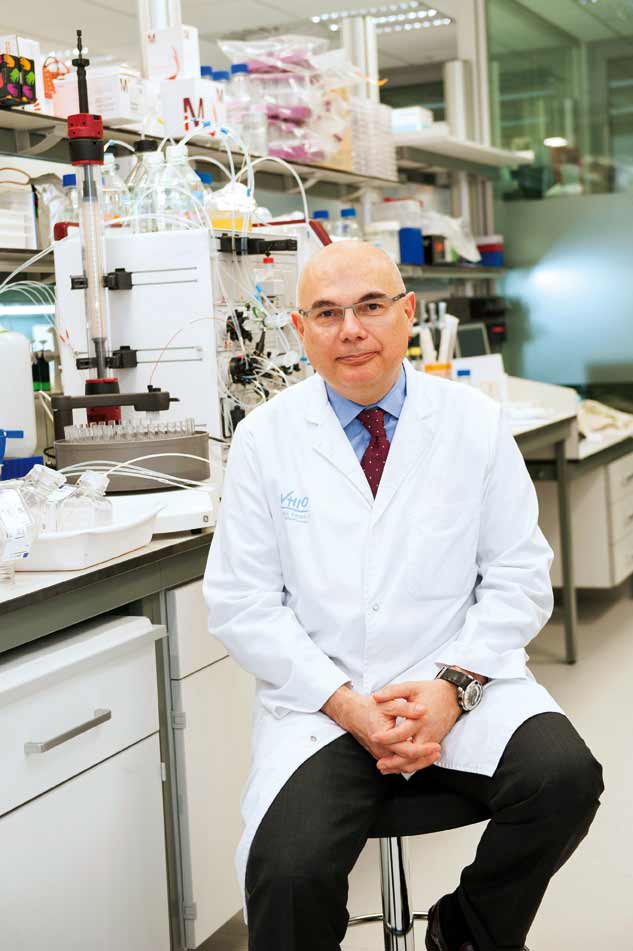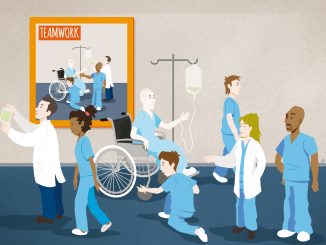 Josep Tabernero is active at many levels. He does hands-on translational research in the lab and clinic, he directs one of Europe’s top cancer institutes, and he will shortly be taking over the leadership of the European Society for Medical Oncology. Alberto Costa asked him about his strategy for delivering progress for patients.
Josep Tabernero is active at many levels. He does hands-on translational research in the lab and clinic, he directs one of Europe’s top cancer institutes, and he will shortly be taking over the leadership of the European Society for Medical Oncology. Alberto Costa asked him about his strategy for delivering progress for patients.
Alberto Costa: What are the keys to accelerating progress in treating cancer?
Josep Tabernero: Thanks to major advances in genomic technologies, including widespread implementation of gene panels to diagnose the molecular causes of solid and haematological cancers, the exciting advent of non-invasive liquid biopsies, and steady progress in precisely targeting drug therapies against individual tumours, we have already come a long way.
But we need to get smarter and move faster. In particular, we need to make progress in reversing cancer drug resistance and counteracting tumour cell spread factors.
Novel therapies – immune-based approaches in particular – are being extended to more tumour types, we are learning more about the cancer genome and epigenome, and we are making progress in fine-tuning anti-cancer medicines according to newly classified subtypes, and identifying new avenues for molecularly targeted therapy against metastatic disease.
But continued progress comes with a hefty price tag. First, the cost of basic and pioneering cancer research: improving outcomes for more of our patients in the current era of precision medicine begins here with our preclinical studies. Second, at clinical level, we need to work collectively towards reducing the high – and controversial – cost of novel cancer therapies by better measuring value and benefit. We must also continue to work in partnership to re-adapt clinical trial design in parallel with predictive science and accelerate the approval processes of the established ‘winner’ therapeutics, so we can realistically hope to offer these therapies to the patients who are most likely to benefit, wherever they may be.
AC: How important is the contribution made by academic institutes such as the Vall d’Hebron Institute of Oncology?
JT: Absolutely vital! Academia not only drives the rapidly evolving emerging landscape of oncology research, refining our understanding of the basic hallmarks of cancer, but it also innovates key efforts in early clinical drug development that can, in partnership with industry, accelerate the development of truly transformative drugs.
In VHIO’s case, our purely translational research model benefits immensely from the privileged location situated within the Vall d’Hebron Barcelona Hospital Campus – affording direct access to the entire spectrum of dedicated oncology professionals who care for our patients. This means not only that VHIO’s researchers closely interact with physician-scientists at Vall d’Hebron, but also that translational science and clinical research are tightly connected, spurring the bench-bedside-bench cycle of knowledge.
That said, no academic institute, regardless of location, ranking or standing, can realistically hope to drive progress alone. It is thanks to the collective belief in strong partnerships and leading consortia that we avoid costly duplication and speed up results. Academic institutes must combine their strengths with chosen partners, depending on the sphere of research, if they are to reach the end goal faster.
AC: Could progress in new treatments and therapeutic strategies be accelerated by giving academic research groups more of a say over what questions are asked and how they are answered?
JT: It’s not only a question of more say – it’s more about the need for us all to get organised and act in concert to establish the frameworks and tools required to deliver cost-effective precision cancer treatment and care in an equitable and affordable way. In the current climate, with the spiralling costs of novel anti-cancer therapies, healthcare systems are not sustainable. We must now start to make realistic, increasingly evidence-based decisions, with the pricing efficacy of cancer drugs a central consideration. We must work together to objectively gauge the factors that influence drug prices in each country, and engage with policy makers and the industry to rethink and adjust the drug development agenda accordingly.
AC: Is progress being held back by a culture emphasising competition over collaboration within the academic community?
JT: The most pioneering research of excellence in biomedicine, and particularly in oncology, is recognised and supported by competitive grants, including funding from the European Research Council (ERC) and the European Commission Horizon 2020 calls. That’s a fact. Many of these projects involve multicentre partnerships and promote strong collaboration across borders. As long as research institutions can apply for these opportunities, which are awarded based on the promise and quality of proposed projects, then worthy academic groups will continue to advance the oncology field.
In terms of equal access to funding programmes, the uncertain climate triggered by Britain’s vote to exit the EU is a cause for concern. We must stand together to protect cross-border partnerships and projects, strengthen our cancer science through continued funding, and defend the mobility and exchange of talent throughout our laboratories and hospitals.
AC: How do you manage to lead the VHIO at the same time as playing a very active role in clinical/translational research, and soon taking on the presidency of ESMO?
JT: I am very lucky to be supported by many superb teams and flanked by dedicated and talented colleagues. Without them, I couldn’t possibly hope to do what I do – there simply wouldn’t be enough hours in the day! I am honoured and privileged to work alongside so many exceptionally gifted individuals who uphold the same ethos as me: there is no ‘I’ in team.
AC: How do you see the future of ESMO, and what would you like to achieve during your tenure as President?
JT: ESMO has both the responsibility and the will to move multidisciplinarity in oncology forward. While medical oncology will rightly remain at the core of its activities, our Society must continue to foster, nurture and develop essential strategic partnerships with other specialties and target groups, collaborating to speed up progress, with the interests of patients at the centre of everything we do.
I will seek to better respond to the growing needs, pressures and daily obstacles faced by medical oncologists – within Europe and beyond – and tailor specific actions matched to the regional needs. I want to help alleviate some of the pressures on the up-and-coming generation, who face heavy burdens and burn-out that could cost our specialty dearly if not addressed.
ESMO is perfectly equipped to provide critical intelligence aimed at better guiding policy makers and government authorities in their priority setting towards sustainable healthcare systems. As a future ESMO President, I will strongly support actions led by our Cancer Medicines Working Group, together with ESMO’s policy committees, to identify and act on these region-based realities and promote a multi-stakeholder rethink of reimbursement policies, cost settings and pricing.
Josep Tabernero is Director of the Vall d’Hebron Institute of Oncology, in Barcelona, and head of Medical Oncology at Vall d’Hebron University Hospital. He is very active in translational research and phase I studies, with a special focus on EGFR-family inhibitors and IGFR-PI3K-Akt-mTOR pathway inhibitors, and is also involved in phase II and III studies with new chemotherapy agents in gastrointestinal tumours.






Leave a Reply